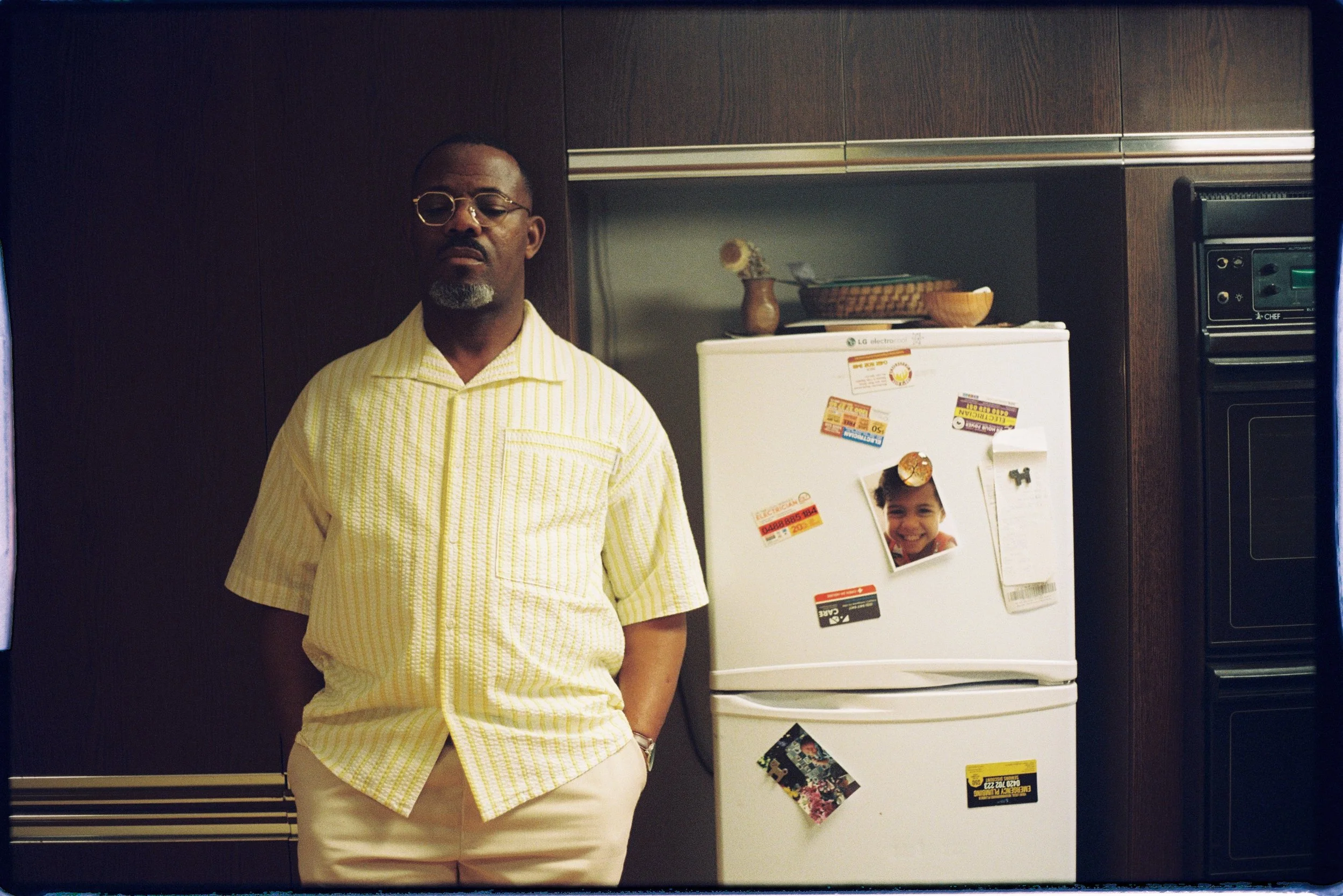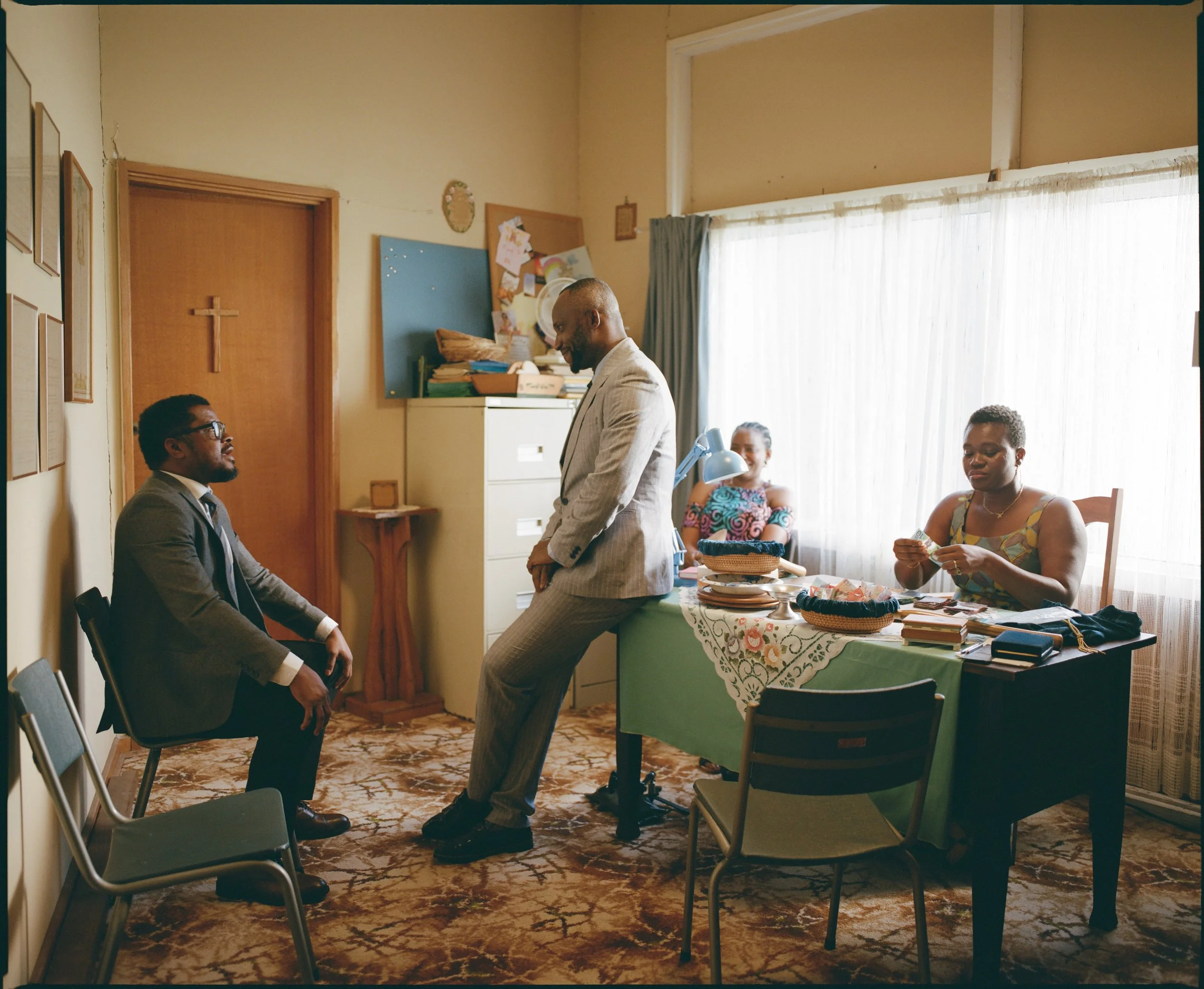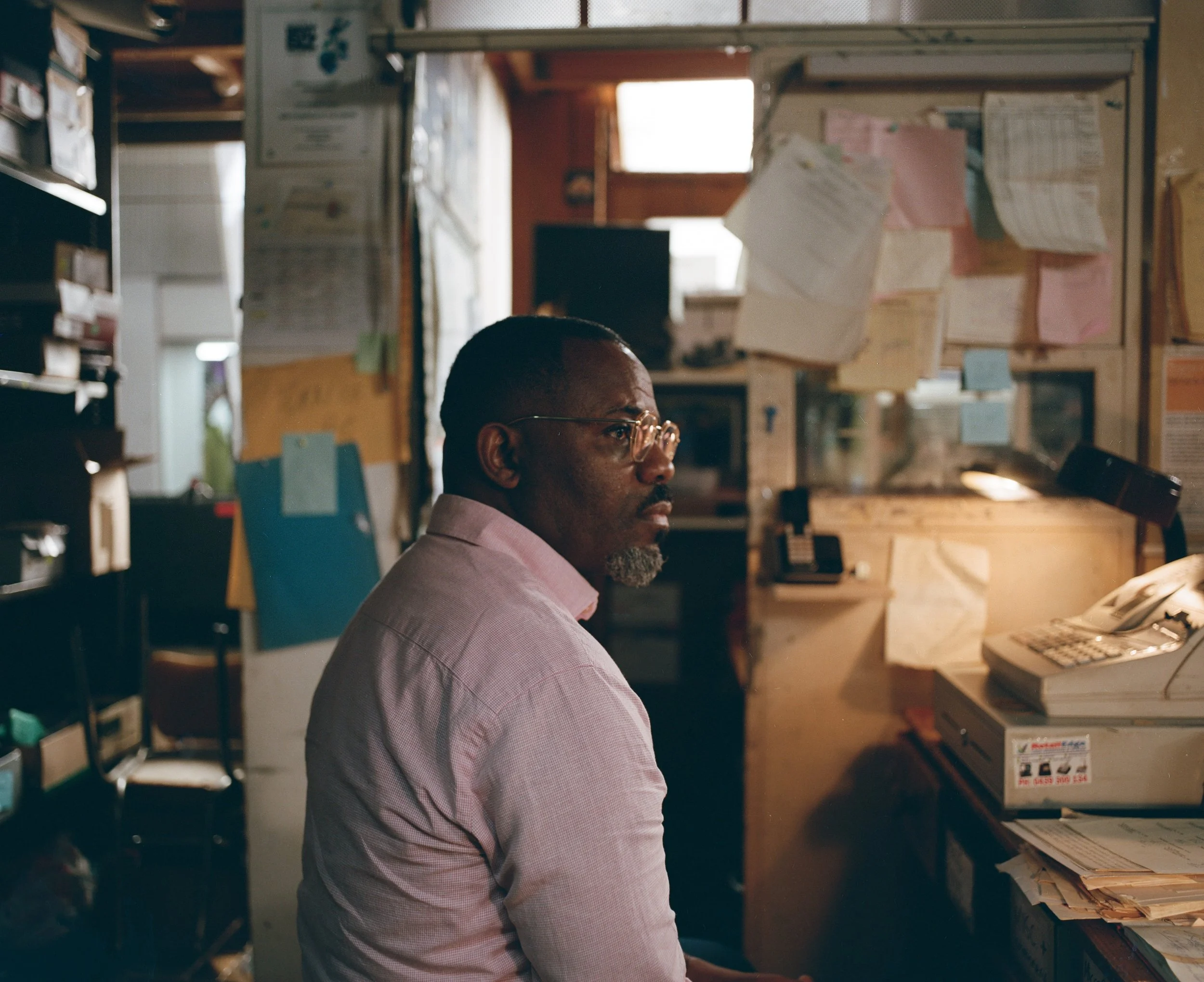Interview with Okey Bakassi, Star of ‘Pasa Faho’
Okey Bakassi has spent more than three decades making Nigerians laugh. During our interview, his voice offers a unique kind of warmth that makes you understand why Nigeria has showered him with love for decades: nine seasons on My Flatmates, one of Africa’s most successful sitcoms, a radio show, It’s Okay with Okey, on Lagos Talks 91.3 FM, stand-up comedy that has sold out across the country, and now, unexpectedly, a crown. His Umuihuocha community recently selected him as their new king, a role that rotates among villages in Igbo tradition rather than passing through bloodlines. “We lost our former king about a year plus ago, and usually tradition demands that a mourning period of one year be allowed, after which the king is replaced,” he explains. “In our own case, the kingship is not hereditary, it’s rotational.”
It’s this same understanding of tradition and belonging that makes his role in Pasa Faho feel so personal. In the Australian film, Bakassi plays Azubuike, a Nigerian father struggling to connect with the mixed-race son he barely knows. “The story is relatable. I have a son who lives and schools in Canada. He’s been there for his entire education while I live and work in Nigeria. I understand the struggles of an African father trying in a special way to connect with his son who lives in the Western world and has more of Western influence or values than that of Africa.” The parallels to his own life run deeper than plot. Bakassi’s father served in the Nigerian armed forces and was mostly gone during his childhood. “My dad served in the military and for the most part wasn’t home. I grew up mostly with my mom. It was in the latest stage of my life when I was privileged to spend enough time with my dad,” he says. Now his son lives that same distance, and when Bakassi read the script, something clicked. “Having to do that story gave me the time to, side by side, look at my own life, that of my son, and that of my son in the movie, and see how all these things are interwoven. I know lots of friends back home who are in that same exact situation. So for me, it was more of a moment of reflection looking at it and saying, wow, this is what a lot of us are going through, especially those of us who have family in diaspora.”
Playing Azubuike meant confronting a specific kind of masculinity rooted deep in Igbo culture, and Bakassi understood the stakes. “In Igbo culture, a man must not show weakness. A man is seen as the alpha figure, the leader, the warrior, the provider, and your success as a man is measured against your ability to satisfy this role of protector and provider for your family. It’s cultural, it’s rooted in our culture. I’m looking at myself as some sort of cultural ambassador of our people. Because if I don’t deliver it convincingly, there are a lot of Igbo people who will watch the movie and say, "Hmm, this is not who we are, or this is exactly who we are.”
Bakassi has watched Hollywood’s attempts to portray African characters, how they capture accent and appearance but miss something essential underneath. “Oftentimes, when Hollywood plays African characters, especially those from outside of Africa, yes, they try to mimic the accent. Yes, they get someone who has a color to play the character. But at the end of the day, the delivery, oftentimes, is not that deep reflection of our people and how we like to project ourselves.” So he approached Azubuike with precision, determined to capture the particular way Igbo men hold themselves even when everything is falling apart. “He had to project the kind of strength an Igbo man likes to project, even when he’s financially struggling. He still wants to present himself as ‘I’ve got this. I’ve got this,’ until it becomes obvious to him that, well, sometimes you have to eat the humble pie, and admit to yourself that you don’t have control over everything.”
There were moments on set when it was quite emotional. “I’m looking at my son. I can see his cultural struggles, because especially when you’re mixed race, you don’t know if you’re fully accepted as Black and fully accepted as white. Being raised in your own mother’s part of the world, that is all you have known. You don’t know your father’s side of the world. But there are expectations that you’re going to become a man like your father. Sometimes it’s not just about me as the father figure who’s playing this father role. You sometimes are so worried about the young boy who is coming into this world. As a man, you already know the challenges he’s going to face, the general challenges that men face, plus the fact that he is of mixed race. The things that he’s going to go through, the heavy expectations back home if he ever decides to relocate and live in Africa, the challenges he’s going to face. You know all this.”
One scene specifically crystallizes the impossible balance between honoring tradition and appealing to a global audience. Azubuike buys a goat to celebrate his son’s homecoming, a traditional gesture of love and welcome in Igbo culture. “As an African man, I bought the goat to celebrate my son, his homecoming, that he’s finally coming to live with me. Which is a very African thing. So you either buy live chicken or goat and slaughter it to celebrate your son.” In their tradition, the goat would be killed in front of the child as a lesson about manhood and provision, teaching the hard truth that “you can’t make steak without anything dying.” But the film couldn’t show that moment in its full cultural context. “When you’re dealing with the global environment where there’s cruelty to animals, there are things that some cultures will not accept to be shown, not on TV, or in a film, then you have to hide those scenes. You have to downplay those scenes. But for us, culturally, it takes away some of the moments, some of those impacts that you want to make there.”
Despite these compromises, being part of Pasa Faho meant something profound to Bakassi. “For me, it was a very proud moment that far away in Australia, we are telling a story that projects my culture, who we are, positively too. Because oftentimes when Africans, Nigerians, are portrayed in movies, they give it that negative spin.”The crew embraced him without any questions, embodying the very borderlessness the film advocates for. “You get in there and you see the kind of love that you receive from the crew and everybody else who was part of the production, despite the fact that we were meeting each other for the very first time ever. It makes your job as an actor very easy because now you are working in an environment with people that you’re meeting for the first time, but you already feel like they are your brothers and your sisters, that you’re one family, that you’re one community.”
“You look at the story, the way it is evolving, even in your struggles, you are not looking at it from the point of view of being victimized. You’re looking at it from the point of view of a survivor. This is a human struggle. You have to survive just like all these other people who are not the same color of your skin.” It’s a perspective that reflects Bakassi’s broader thinking about what immigrant families need, and his views have evolved through making this film. “As much as we want children that are raised abroad, in diaspora, to be very African, to imbibe everything African, we should also realize that we are raising global citizens who are not just going to be Africans, but ambassadors of their race, and people who are going to integrate into an environment that may not entirely be their ancestors’ environment.”
He sees a future where borders matter less, where technology connects us in ways that make geography almost irrelevant. “The world is becoming a smaller community. We are being connected faster and in more intimate ways than we ever imagined through technology. I see a future world where there will be no borders.” But that future doesn’t mean abandoning the values that make us who we are. “What’s important is that we still have strong values. Strong values that our kids imbibe will help them navigate the very rough world that they find themselves, because the world is not going to be any safer. It’s not ever going to be fair.”
What troubles Bakassi, though, is watching politicians weaponize division even as technology brings us closer. “My concern, my worry, is the hate, the level of hate that the politicians are constantly injecting into society just because they have to win elections. You would think that the world that is making the level of advancement that we are making collectively in technology shouldn’t have a place for hate anymore. Any kind of hate. But that is not the case.” Against this backdrop of manufactured division, Pasa Faho offers a different vision of what’s possible. “A Nigerian man married to an Australian woman and trying to raise a family despite their struggles. If we can constantly collaborate like that and partner like that, I think the world will be a better place because we are underneath, we are all human. Same red blood.”
Near the end of our conversation, Bakassi returns to the question of masculinity and what the film has taught him about strength and vulnerability. “Gone are the days when you see ‘men don’t cry.’ A man has to cry out if he’s in need. If he has something troubling him, because, like they say, a problem shared is a problem half solved. You never can tell who has the solution when you cry out. So we should learn to accept our vulnerabilities as well as try to project our strengths and inculcate our values in our children.”
Bakassi has spent decades making Nigeria laugh, building a career on joy and lightness. In Pasa Faho, he does something harder He shows what it costs to be strong, and what we gain when we finally admit we are not.



